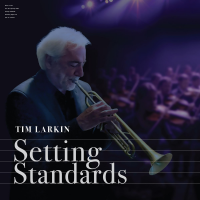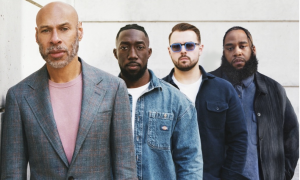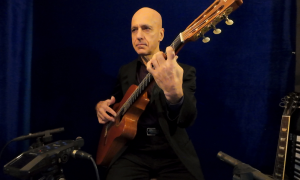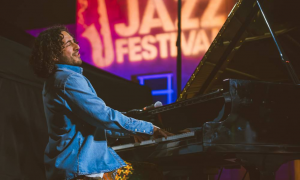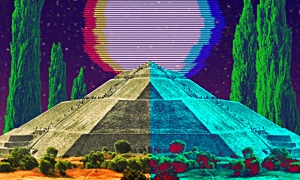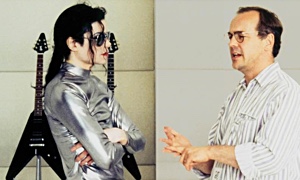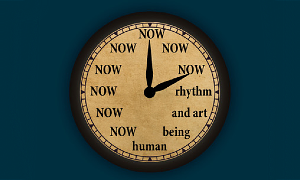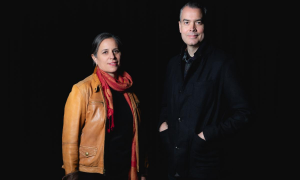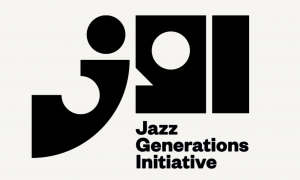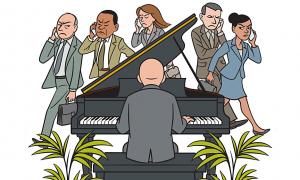Yesterday, we posted the beginnings of an interview we conducted with Dave McKinney, the multi-talented founder of Jammbox and the creator of Discovr, a highly touted music discovery application available on the iPhone and the iPad.
Today, we present its conclusion, which includes a conversation about the state of the digital music market, and what his company does with its users data.
Your previous responses offers a tidy segue into the last topic I wanted to touch on. You've had such amazing success with Discovr so far—it's in the Apple App Starter Kit, it's the number one music app in 12 countries, top five in 30 others, and you've already touched on what you think of as the underpinning reasons for that. But to me this raises a larger question, which is: how popular do you think that Discovr and apps of its kind can become?
I ask because there's this weird disconnect between what goes on inside the music industry, where everyone is very open to trying new things, everyone is going to give every new app that comes out a test-drive, and the real world, where there's a persistent lack of public awareness of things like music subscription models, and the newest ways to kind of aggregate information. People still, for the most part, interact and look for music in a very low-tech, 20th century way. They have their friends, and they know who they trust.
Okay, this is a great question. There are a couple of questions in there. Firstly, you talked about streaming, which is an interesting question. You and I, we understand what on-demand streaming is, and what companies like Spotify and MOG and Rdio and Rhapsody are all trying to do. They're trying to make music ubiquitous and accessible anywhere, anytime, and I think that's an incredibly valuable and amazing experience, and it's compelling. And ultimately, I think that when people get exposed to that, and they get to understand what that means, I think that that will be a very persuasive form of media delivery, and I think that people will buy it.
I think that that will become the dominant form of media delivery, but it's very interesting because right now that market, we can call it a new market. If you look at it using start-up terminology, there are different types of markets: there are emerging markets, there are existing markets, existing markets that have been re-segmented, there are new markets, there's a bunch of different market types and each of those types has a series of characteristics. One of the characteristics of a new market is that it's all about having to educate users. It's such a tiny space at the moment, and all of the effort needs to be going into educating users about the value of their services. If it was an existing market, then people would already
Even at a low price, these kinds of services are in Education mode.
understand what it is, so [the market's companies] would be competing based on features, or price, or benefits. But this is a new market, and really those companies aren't even competing against each other yet, because the awareness and adoption of those services is so low.
However, I really think that that will become the main form of media delivery, so I think that it's an exciting time for users, where they can access all kinds of music anywhere for a pretty low price.
The reason I'm talking about streaming because currently with those existing models, they're very much about...they give you access to everything, but if you look at the usage of those models, people say that they typically listen to the stuff they already know. So one of the disconnects, one of the things that's not working correctly with those services is that when you open Spotify, or Rdio or MOG or whatever, there's an overwhelming choice of music right now, and it's actually become a problem. People don't quite know how to deal with that, so what they do is they listen to the things they know.
And people have said to me—this is in the industry, and normal users—if you just kind of listen to the stuff you know, and you just put that on your hard drive, you don't need to pay $10/month for a streaming service because you don't need [all that other music]. So there's something there that hasn't quite been solved yet, and for us as a company, we think there are better ways of helping people to find new music. Hopefully if you're using a service like Spotify or MOG or whatever, really there's a whole world of music to explore, so we want to help you explore that, and introduce you to new types of music that you haven't heard.
I guess the Discovr app is another way to look at that same problem, we're trying to help people look at new music in a different way. We believe that by starting with some music that you love, and know, and then gently introducing you to other music around that, that's similar, we think that hopefully we can introduce you to new types of music. There are different types of music discovery. Discovery itself is a huge field. We think about Pandora Radio, it's a passive experience where you hear new stuff but you don't really have any control over it. Discovr as an app is the opposite—it's very active, and it requires you to be engaged with the app and actively explore, and so there's a whole spectrum of discovery tools and types of experiences, and I think a mix of all of those is what's best for the user. I think social recommendations are extremely valuable. Active exploration can be really fun, but requires effort. Passive listening and recommendation requires no effort, but you're not as engaged. So I think all of those types of services are needed in different ways. And it's early days. I think that it's a whole world of things that are going to happen.
McKinney, in marine biologist mode.
Discovr for us was really a test, to see if we could create an experience around music that we could charge for. We were trying to form a business model for other applications that we're working on. So the result of that test is that yes, people will pay. And, more fundamentally for us, we've actually been able to deal with something that's useful for people. So that's sort of validated what we're trying to do, and the fact that people will pay for it on top of that helps us to go, “Okay, well maybe we can do a business around that." But it's early days, no one really knows, everyone's experimenting and trying out stuff—it's a really exciting time. You know, we don't know what we're doing, we're just testing and trying and having fun. Hopefully people will come along for the ride with us, and I think there are all kinds of services that we're getting to see that are going to change how we look at music, how we listen to music.
One last thing. I noticed when I loaded up the app that it scanned my iTunes, and populated the favorites section with my most-played artists. What happens with that data? Does the Echo Nest keep it? Is it tied to any kind of buyer information?
That information happens purely on the client side, so within the application on the device itself. None of the data go out to the Echo Nest. We don't have access to those data in that way. It's all happening on the clients' side. So we can pool that information from the client down to a server or something if we needed to, but really our goal with that is to make a better experience for the user. There's not really any value for us in those data, for an individual anyway. As a company we're not going there. It's just a way to make the user experience better. There might be a reason why that data might be useful in aggregate, but it's not really our focus. You know we're not trying to extract information about the users. It's not the type of company we want to be or become.
From a user perspective, I think it makes total sense. I felt compelled to ask because, as I'm sure you're aware, personal data is sort of a hot-button issue these days.
No it's a good question actually. I guess my goal as a company, speaking on behalf of our tiny little team, is that ultimately we want to make great user experiences, like great experiences for people to use the apps, that's our goal, so if we can find a way to make that better, in some way, then we'll do that. But in the same way, we're very conscious of respecting the boundaries of what's appropriate and what's acceptable. We basically sit within the Apple STK Guidelines. We're not a radical company, always trying to push the boundaries, seeing what we can get away with. I mean I come from an artist's background, so I'm very interested in seeing that artists get paid! Everything we do is about doing things in the legal way, where everyone gets compensated in the appropriate manner in terms of rights.
Today, we present its conclusion, which includes a conversation about the state of the digital music market, and what his company does with its users data.
Your previous responses offers a tidy segue into the last topic I wanted to touch on. You've had such amazing success with Discovr so far—it's in the Apple App Starter Kit, it's the number one music app in 12 countries, top five in 30 others, and you've already touched on what you think of as the underpinning reasons for that. But to me this raises a larger question, which is: how popular do you think that Discovr and apps of its kind can become?
I ask because there's this weird disconnect between what goes on inside the music industry, where everyone is very open to trying new things, everyone is going to give every new app that comes out a test-drive, and the real world, where there's a persistent lack of public awareness of things like music subscription models, and the newest ways to kind of aggregate information. People still, for the most part, interact and look for music in a very low-tech, 20th century way. They have their friends, and they know who they trust.
Okay, this is a great question. There are a couple of questions in there. Firstly, you talked about streaming, which is an interesting question. You and I, we understand what on-demand streaming is, and what companies like Spotify and MOG and Rdio and Rhapsody are all trying to do. They're trying to make music ubiquitous and accessible anywhere, anytime, and I think that's an incredibly valuable and amazing experience, and it's compelling. And ultimately, I think that when people get exposed to that, and they get to understand what that means, I think that that will be a very persuasive form of media delivery, and I think that people will buy it.
I think that that will become the dominant form of media delivery, but it's very interesting because right now that market, we can call it a new market. If you look at it using start-up terminology, there are different types of markets: there are emerging markets, there are existing markets, existing markets that have been re-segmented, there are new markets, there's a bunch of different market types and each of those types has a series of characteristics. One of the characteristics of a new market is that it's all about having to educate users. It's such a tiny space at the moment, and all of the effort needs to be going into educating users about the value of their services. If it was an existing market, then people would already
Even at a low price, these kinds of services are in Education mode.
understand what it is, so [the market's companies] would be competing based on features, or price, or benefits. But this is a new market, and really those companies aren't even competing against each other yet, because the awareness and adoption of those services is so low.
However, I really think that that will become the main form of media delivery, so I think that it's an exciting time for users, where they can access all kinds of music anywhere for a pretty low price.
The reason I'm talking about streaming because currently with those existing models, they're very much about...they give you access to everything, but if you look at the usage of those models, people say that they typically listen to the stuff they already know. So one of the disconnects, one of the things that's not working correctly with those services is that when you open Spotify, or Rdio or MOG or whatever, there's an overwhelming choice of music right now, and it's actually become a problem. People don't quite know how to deal with that, so what they do is they listen to the things they know.
And people have said to me—this is in the industry, and normal users—if you just kind of listen to the stuff you know, and you just put that on your hard drive, you don't need to pay $10/month for a streaming service because you don't need [all that other music]. So there's something there that hasn't quite been solved yet, and for us as a company, we think there are better ways of helping people to find new music. Hopefully if you're using a service like Spotify or MOG or whatever, really there's a whole world of music to explore, so we want to help you explore that, and introduce you to new types of music that you haven't heard.
I guess the Discovr app is another way to look at that same problem, we're trying to help people look at new music in a different way. We believe that by starting with some music that you love, and know, and then gently introducing you to other music around that, that's similar, we think that hopefully we can introduce you to new types of music. There are different types of music discovery. Discovery itself is a huge field. We think about Pandora Radio, it's a passive experience where you hear new stuff but you don't really have any control over it. Discovr as an app is the opposite—it's very active, and it requires you to be engaged with the app and actively explore, and so there's a whole spectrum of discovery tools and types of experiences, and I think a mix of all of those is what's best for the user. I think social recommendations are extremely valuable. Active exploration can be really fun, but requires effort. Passive listening and recommendation requires no effort, but you're not as engaged. So I think all of those types of services are needed in different ways. And it's early days. I think that it's a whole world of things that are going to happen.
McKinney, in marine biologist mode.
Discovr for us was really a test, to see if we could create an experience around music that we could charge for. We were trying to form a business model for other applications that we're working on. So the result of that test is that yes, people will pay. And, more fundamentally for us, we've actually been able to deal with something that's useful for people. So that's sort of validated what we're trying to do, and the fact that people will pay for it on top of that helps us to go, “Okay, well maybe we can do a business around that." But it's early days, no one really knows, everyone's experimenting and trying out stuff—it's a really exciting time. You know, we don't know what we're doing, we're just testing and trying and having fun. Hopefully people will come along for the ride with us, and I think there are all kinds of services that we're getting to see that are going to change how we look at music, how we listen to music.
One last thing. I noticed when I loaded up the app that it scanned my iTunes, and populated the favorites section with my most-played artists. What happens with that data? Does the Echo Nest keep it? Is it tied to any kind of buyer information?
That information happens purely on the client side, so within the application on the device itself. None of the data go out to the Echo Nest. We don't have access to those data in that way. It's all happening on the clients' side. So we can pool that information from the client down to a server or something if we needed to, but really our goal with that is to make a better experience for the user. There's not really any value for us in those data, for an individual anyway. As a company we're not going there. It's just a way to make the user experience better. There might be a reason why that data might be useful in aggregate, but it's not really our focus. You know we're not trying to extract information about the users. It's not the type of company we want to be or become.
From a user perspective, I think it makes total sense. I felt compelled to ask because, as I'm sure you're aware, personal data is sort of a hot-button issue these days.
No it's a good question actually. I guess my goal as a company, speaking on behalf of our tiny little team, is that ultimately we want to make great user experiences, like great experiences for people to use the apps, that's our goal, so if we can find a way to make that better, in some way, then we'll do that. But in the same way, we're very conscious of respecting the boundaries of what's appropriate and what's acceptable. We basically sit within the Apple STK Guidelines. We're not a radical company, always trying to push the boundaries, seeing what we can get away with. I mean I come from an artist's background, so I'm very interested in seeing that artists get paid! Everything we do is about doing things in the legal way, where everyone gets compensated in the appropriate manner in terms of rights.






